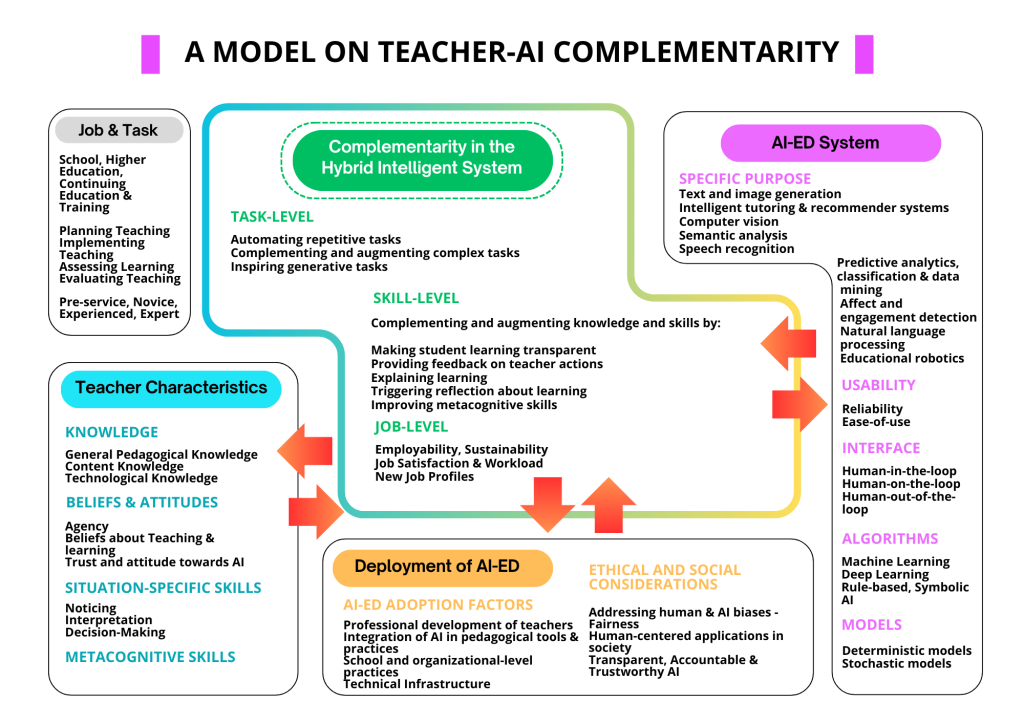Project Overview and Relevance
The Teacher-AI Complementarity (TAICo) project addresses a pressing challenge at the intersection of education and technology: how to ethically and effectively integrate Artificial Intelligence (AI) into educational settings to complement and enhance the teaching profession. The overarching goal is to develop, implement, and validate a comprehensive model of Teacher-AI Complementarity. This model will guide the integration of AI technologies across a diverse set of European contexts, including primary, secondary, higher education, and continuing education.
The relevance of this initiative is underscored by the rapid proliferation of AI technologies and their profound implications for teaching practices. While AI holds potential to automate repetitive tasks and augment teachers’ capabilities, its unregulated integration risks exacerbating skill gaps and undermining the human-centric essence of education. With Europe facing a critical shortage of teachers and increasing demands for lifelong learning, TAICo’s timely intervention seeks to align AI’s capabilities with human skills, fostering inclusive growth and addressing global sustainability challenges. By engaging over 200 educators across diverse educational contexts, the project aims to derive evidence-based, practical guidelines for educators, policymakers, and the EdTech industry.
Methodology
The project employs a multidisciplinary, participatory methodology, structured into two research strands (experimental and design-based) and informed by comprehensive stakeholder engagement.
Theoretical Framework and Initial Model
At the core of TAICo is the hybrid intelligent system model (Figure 1), which conceptualizes teacher-AI interactions across three dimensions: task, skill, and job levels. This model factors in teacher characteristics, AI system properties, deployment conditions, and broader job contexts, providing a framework for designing and evaluating teacher-AI complementarity.

Figure 1: The initial Teacher-AI Complementarity Model used in the project
Research Strands
- Experimental Research: This strand focuses on developing and validating the theoretical model through empirical studies in authentic educational settings. The initial exploratory research includes observational studies and cognitive task analyses. These findings will inform hypotheses tested in confirmatory research, where field studies will evaluate AI’s impact on teaching tasks, skills, and knowledge.
- Design-Based Research: This strand adopts participatory design methods to co-create AI tools, guidelines, and professional learning frameworks. Phase 1 involves co-design sessions with educators and EdTech developers to identify needs and ethical considerations. Phase 2 focuses on iterative piloting and validation of solutions in real-world settings.
Use Cases
The project explores six diverse educational contexts, each showcasing unique applications of AI to complement teaching tasks:
- Secondary Education Teachers (Finland): Focusing on AI that supports the development of metacognitive skills by monitoring collaborative learning tasks. For instance, by using speech recognition, natural language processing (NLP), and dialogue management to identify learning gaps and prompt regulation, helping teachers detect and support student self-regulation during collaboration.
- Continuing Education Trainers (Austria): Through AI that assists in creating and evaluating lesson plans by analyzing content alignment with pedagogical goals. Using semantic analysis and automated feedback generation, the AI aids teachers in refining their learning designs, enhancing their ability to plan meaningful activities.
- Primary, Secondary, and Vocational Education Teachers (Estonia): In this context, AI supports problem-solving skills by analyzing digital trace data to monitor student progress, diagnose skill gaps, and provide feedback. This helps teachers tailor tasks to better match students’ needs, improving classroom interventions.
- Primary Education Teachers (The Netherlands): Including teacher-AI implementations that enhance subject-specific teaching in mathematics by tracking student progress using Bayesian Knowledge Tracing (BKT). The system provides personalized recommendations and insights into individual learning paths, enabling teachers to better address challenges in student mastery.
- Secondary Education Teachers (Germany): Implementing AI technologies that focus on monitoring and diagnosing student mastery in mathematics. By analyzing student input and progress, the AI systems aid teachers in selecting relevant materials and tasks, ensuring effective feedback and support.
- Higher Education Teachers (United Kingdom): Through AI that facilitates collaboration skill development by analyzing group interactions through computer vision, NLP, and speech recognition. Teachers receive insights into student engagement and discourse, enabling them to provide targeted feedback to improve collaborative outcomes.
Each context will aim to demonstrate how AI can complement teaching tasks by enhancing monitoring, diagnosing, and supporting learning processes, while considering system transparency, accountability, and adaptability.
Ethical Considerations
Ethical integrity is central to TAICo. The project emphasizes human-centric AI design, ensuring transparency, accountability, and inclusivity. Potential risks—including biases in AI algorithms, data privacy concerns, and teacher over-reliance on AI—are mitigated through iterative co-design and stakeholder consultations. These measures align with the EU’s Ethics Guidelines for Trustworthy AI.
Gender Dimensions and Inclusivity
Recognizing gender disparities in education and technology sectors, TAICo adopts a gender-sensitive approach. Efforts include:
- Ensuring balanced representation of male and female teachers in case studies.
- Addressing biases in AI tool development and application.
- Providing targeted training for teachers in socioeconomically disadvantaged areas.
Additionally, the project acknowledges the spectrum of gender identities, integrating inclusive practices in data collection and professional development.
